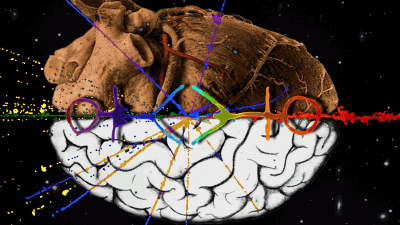It turns out that just 'feeling' hungry changes the immune system

Previous
Brain sensing of metabolic state regulates circulating monocytes | Science Immunology
https://www.science.org/doi/10.1126/sciimmunol.adr3226
Even just thinking you're hungry could change your immune system – new research in mice
https://theconversation.com/even-just-thinking-youre-hungry-could-change-your-immune-system-new-research-in-mice-253501

In a paper published in Science Immunology on April 4, 2025, a research team led by João Paulo Cavalcanti de Albuquerque of the University of Manchester reported the results of an experiment in which they manipulated the hunger sensation in mice to examine how the number of immune cells changes.
In this experiment, when the research team stimulated the hunger neurons, called 'AgRP neurons,' in mice that had already eaten enough food, the mice felt a strong urge to eat and experienced a significant decrease in
Monocytes play an important role in the immune system by ingesting bacteria in the blood and promoting inflammation, but it is known that too many of them can worsen cancer, autoimmune diseases, and arteriosclerosis.
On the other hand, when hungry mice had their POMC neurons stimulated, their monocyte counts returned to normal even though they had not eaten anything. These experiments suggest that as long as the brain knows whether it is hungry or full, it does not need to actually be hungry.
'Our new study calls into question the long-held idea that immunity is shaped primarily by physical changes such as blood sugar or nutrient levels. Instead, it shows that only what the brain 'thinks' is happening - our perception - can change immunity,' said Cavalcanti de Albuquerque and co-author Giuseppe D'Agostino.

Furthermore, to clarify the relationship between the brain's perception and the immune system, the research team investigated how information is transmitted between the brain and the liver. The liver is an important organ with various functions, including energy storage, and is known to be closely related to the bone marrow, where blood and immune cells are produced.
This study found that activation of hunger neurons suppressed sympathetic nervous system activity and also suppressed the liver's detection of nutrients. This suggests that 'how the brain thinks changes how the liver detects the body's energy status.' In other words, even if there is actually enough nutrition, if the brain sends a signal that there is insufficient energy, the liver will think so too.
As a result of this action, the level of
It is not known why the brain adjusts immune function when it senses hunger, but Cavalcanti de Albuquerque and his colleagues suggest that one possibility is that multi-organ communication has developed to predict and respond to potential energy shortages. For example, if the brain senses that there is less food available, it may conserve energy early or adjust immune function in advance to prepare for a real crisis.

'If these findings in mice are confirmed in humans, they could potentially improve our understanding of diseases in which the immune system is overactivated, such as cardiovascular disease, multiple sclerosis, and cachexia in cancer patients, as well as metabolic and eating disorders that often involve chronic inflammation and immune-related complications, such as obesity and anorexia. Furthermore, if the brain is linked to strengthening or suppressing the immune system, it may be possible to develop new brain-targeting approaches to support current immune-modulating therapies.'
'While there is still a lot we don't know, what we do know is that how the brain perceives the body's energy needs influences the immune system,' Cavalcanti de Albuquerque and her colleagues wrote. 'This raises further questions about how stress, eating disorders, and even the perception of food insecurity can lead to inflammation and disease.'
Related Posts:







